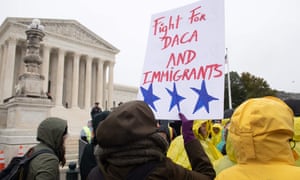John Roberts wrote in 5-4 majority opinion the administration’s decision to end program was ‘arbitrary and capricious’

Photograph: Saul Loeb/AFP via Getty Images
The US supreme court has rejected Donald Trump’s bid to end the program that made it possible for undocumented immigrants brought to the country as children to live and work in the US without fear of deportation.
More than 652,800 people, including doctors fighting the coronavirus, were waiting on the decision about the program, Deferred Action for Childhood Arrivals, commonly known by its acronym Daca.
Daca allowed young people, known as Dreamers, who were raised without legal immigration status in the US, to obtain renewable, two-year authorizations to live and work in America. It did not provide a path to citizenship.
Chief Justice John Roberts wrote the 5-4 majority opinion, arguing that the Trump administration’s decision to end the program was “arbitrary and capricious”.
The case hinged primarily on whether the Trump administration followed proper procedure in its decision to end Daca – not whether it could legally end it. As the majority opinion states, “all parties agree that it may”.
Thursday’s decision leaves open the possibility that the Trump administration could seek, again, to end the program, though it would be difficult to do so before the November election.
Such a decision would also be unpopular – there is broad support for Dreamers. Even a majority of Trump supporters said the group should be protected, according to a Politico and Morning Consult poll published this month.
In response to the decision, Trump tweeted: “These horrible & politically charged decisions coming out of the Supreme Court are shotgun blasts into the face of people that are proud to call themselves Republicans or Conservatives. We need more Justices or we will lose our 2nd. Amendment & everything else. Vote Trump 2020!”
Justice Clarence Thomas argued that the decision was a politically motivated stopgap, in a dissent joined by justices Samuel Alito and Neil Gorsuch. “It has given the green light for future political battles to be fought in this court rather than where they rightfully belong – the political branches,” Thomas wrote.
Barack Obama enacted Daca in 2012. The policy landed in the court system after the Trump administration rescinded it in September 2017. Trump has repeatedly said he supports the people Daca shielded from deportation, but for nearly three years their futures have been uncertain as the policy wound its way through the legal system.
The supreme court considered whether the program could continue, at a November hearing.
The effort to seek protections for this population emerged two decades ago, with the introduction of the Dream Act in 2001. For the next 20 years, Congress repeatedly tried and failed to pass different versions of the legislation. Meanwhile, a fervent group of activists created an influential movement to secure protections for Dreamers.
In states including California, Washington and New York, Dreamer activists pushed for laws that made it possible for them to obtain driver’s licenses, and to qualify for college loans and reduced tuition programs.
As of September 2019, 652,880 people had Daca, including roughly 27,000 healthcare practitioners and nearly 9,000 teachers. About 80% of the people who have it are from Mexico, and nearly half live in California and Texas.
Obama celebrated the supreme court’s decision. “Eight years ago this week, we protected young people who were raised as part of our American family from deportation,” Obama wrote on Twitter. “Today, I’m happy for them, their families, and all of us.”
Daca is a popular policy. A June 2020 Pew Research survey showed 74% of Americans favored a law which would give legal status to undocumented immigrants who were brought to the US as children.
One of the most powerful Dreamer supporters appeared to be Trump, who spoke positively about the population even while stripping away protections for them and their families.
His administration said shutting Daca down was necessary because it was implemented illegally by Obama in 2012. Trump defended his contradictory position by claiming that eliminating the program would force Congress to reach a deal that supported Dreamers.
Instead, lower courts debated the legality of Daca while the issue received little attention in Congress. Those courts’ decisions allowed Daca to continue, but only for people who had already received it.
By the time the issue reached the supreme court, the case was focused on government rule-making, not whether the program should exist. The first question the supreme court had to answer was whether the nation’s highest court even had jurisdiction to review the case. The court determined that it did.
Much of the supreme court’s discussion at the November oral argument centered on the administrative law that formed the foundation of the case. But Sonia Sotomayor, the first Latina supreme court justice, urged the court to consider the human aspect of the case, particularly because the president had said he would keep Dreamers safe.
Eight of the nine justices ruled the Trump administration’s rescission of Daca does not violate equal protection laws, drawing a line between anti-immigrant and racist comments made by the president and the agency which rescinded the policy.
The lone justice to dispute this was Sotomayor, who wrote: “At the motion-to-dismiss stage, I would not so readily dismiss the allegation that an executive decision disproportionately harms the same racial group that the president branded as less desirable mere months earlier.”


